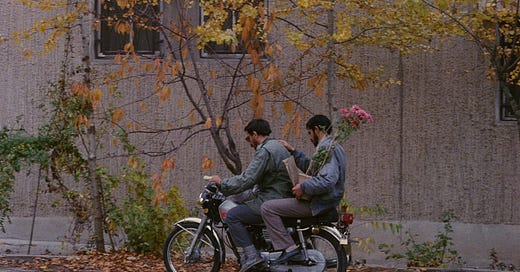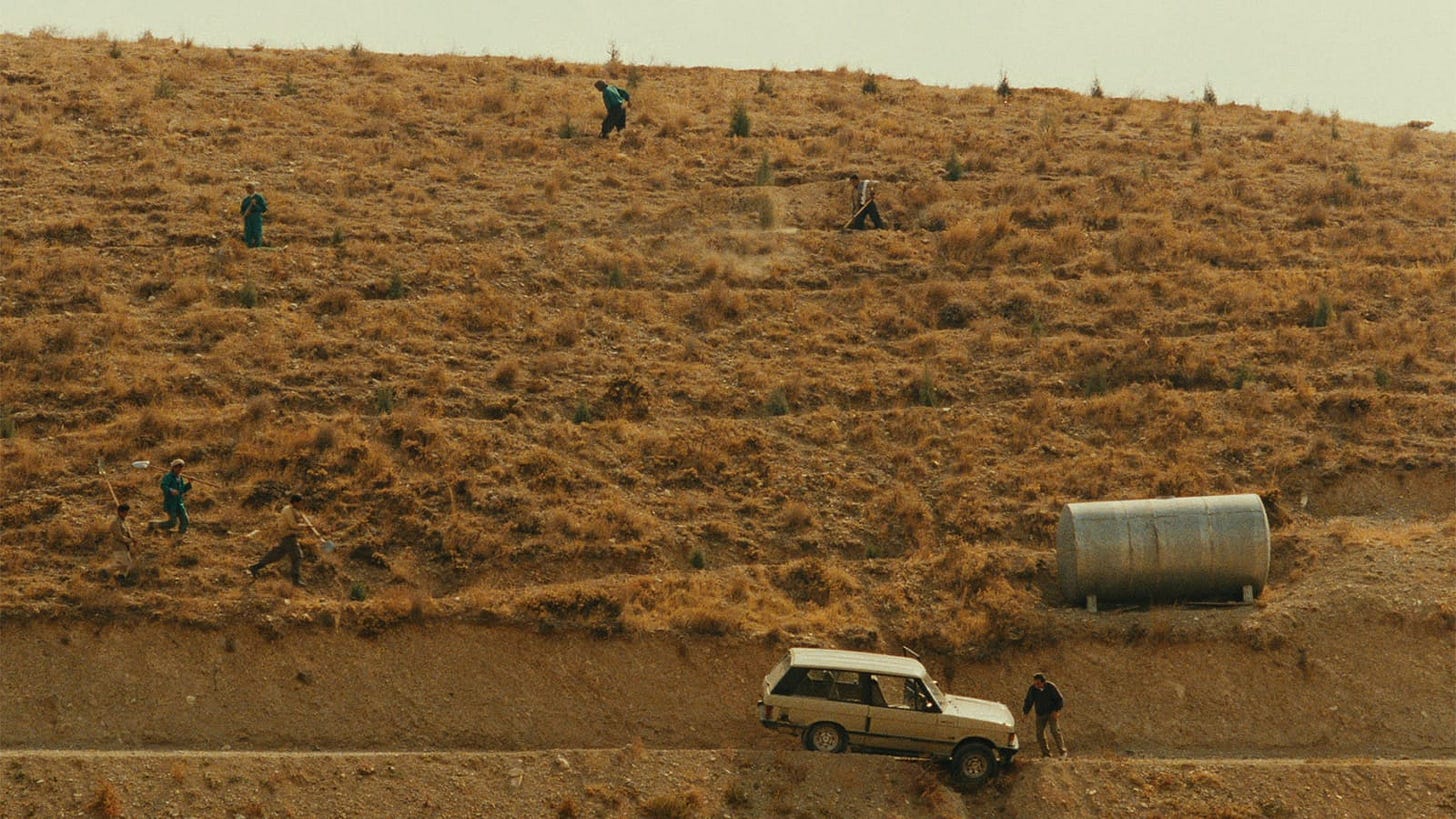Abbas Kiarostami day 1: Close-Up (1990) + Taste of Cherry (1997)
Saturday 1st of February, 12:30-5:10pm in the Richard Hoggart Building cinema
Join us on Saturday the 1st of February from 12:30pm (first film starts at 1pm) for a double bill of films by the key Iranian filmmaker Abbas Kiarostami. At 1pm we will show Close-Up (1990), which will run for 1 hour 38 minutes and finish at 2:40pm. After a 50-minute break we will show Taste of Cherry (1997) at 3:30pm, which will run for 1 hour 39 minutes and finish at around 5:10pm.
Abbas Kiarostami is the most famous and internationally acclaimed director of the Iranian New Wave, and one of the most important directors in world cinema over the past fifty years. As part of our term-long exploration of Iranian cinema, we are showing four of his films. On Saturday the 15th of March we will show another two that he made later, outside of Iran: Certified Copy (2010) and Like Someone in Love (2012). These follow on from our screening of his Koker trilogy last year.
Close-Up (1990) is Kiarostami’s most radical, famous and acclaimed film. For example, in Sight and Sound’s 2022 poll of the greatest films of all time, it came seventeenth in the critics’ poll and ninth in the directors’ poll. A hybrid of fiction and documentary, the film is based on a real-life event where a young, poor man named Hossein Sabzian was arrested for impersonating the well-known Iranian director Mohsen Makhmalbaf – director of A Moment of Innocence (1996). Upon learning about the event, Kiarostami set about making a film about it, enlisting many of the real people involved in the events, including Sabzian and Makhmalbaf. According to Godfrey Cheshire, author of In the Time of Kiarostami: Writings on Iranian Cinema, in an essay for Criterion:
Close-up is thus neither a documentary nor a drama but a provocative, unconventional merging of the two, a meditation on perplexities of justice, social inequity, and personal identity that also subtly interrogates the processes and purposes of cinema. The film met with a mixed, generally unappreciative reaction when it was first shown in Iran in 1990. Abroad, however, it proved singularly successful. Although displayed at second- and third-tier festivals in the West, Close-up made such an impression among critics and cinephiles that it paved the way for Kiarostami’s elevation to Cannes, New York, and other top festivals with his next film, And Life Goes On (1992). Arguably, no film was more dramatic or decisive in heralding the international artistic arrival of postrevolutionary Iranian cinema. At the end of the 1990s, Kiarostami was voted the most important director of the decade by U.S. critics in Film Comment, while dozens of international and Iranian film experts surveyed by the Iranian magazine Film International named Close-up the best Iranian film ever made.
That last superlative seems destined to endure, given Close-up’s status as the film that redefined Iranian cinema, shifting it from the lyrically compassionate, often child-centered work that began emerging after the government-sponsored revival of the country’s cinema in 1983—including Amir Naderi’s The Runner, Bahram Beyzai’s Bashu, the Little Stranger, and Kiarostami’s own Where Is the Friend’s House?—to something much more complex. Close-up seemed to combine the social concern of Italian neorealism, to which the new Iranian films were often compared, with the French New Wave’s cerebral self-expression and formal idiosyncrasy, and to project the whole into the vitalizing context of a postrevolutionary Islamic culture. The film’s key innovations—the unorthodox mix of documentary and fiction, the self-reflexive musing on cinema and its impact, the simultaneous exaltation and questioning of the auteur—may have had certain precedents in both world cinema and Iranian culture, but Close-up fused them in a wholly new and original way.
Taste of Cherry (1997) is another of Kiarostami’s greatest works, and was the first Iranian film to win the Palme d’Or. The film follows Mr Badii, a man driving around the outskirts of Tehran looking for someone who will agree to bury him after he kills himself – a taboo under Islam. He has extended conversations with three people about whether life is worth living. According to A.S. Hamrah:
It is best to see Taste of Cherry without reading anything about it first. It should be seen cold—cold like the ground into which the film’s protagonist, Mr. Badii (Homayoun Ershadi), seeks to consign himself.
Taste of Cherry excludes, cutting away plot and backstory, two things that can bog down a film. It goes in circles and meanders, the concision of its ninety-nine minutes becoming clear only in retrospect. It is meant to conceal, even to frustrate. Instead of tying the story up neatly, its ending does something else.



